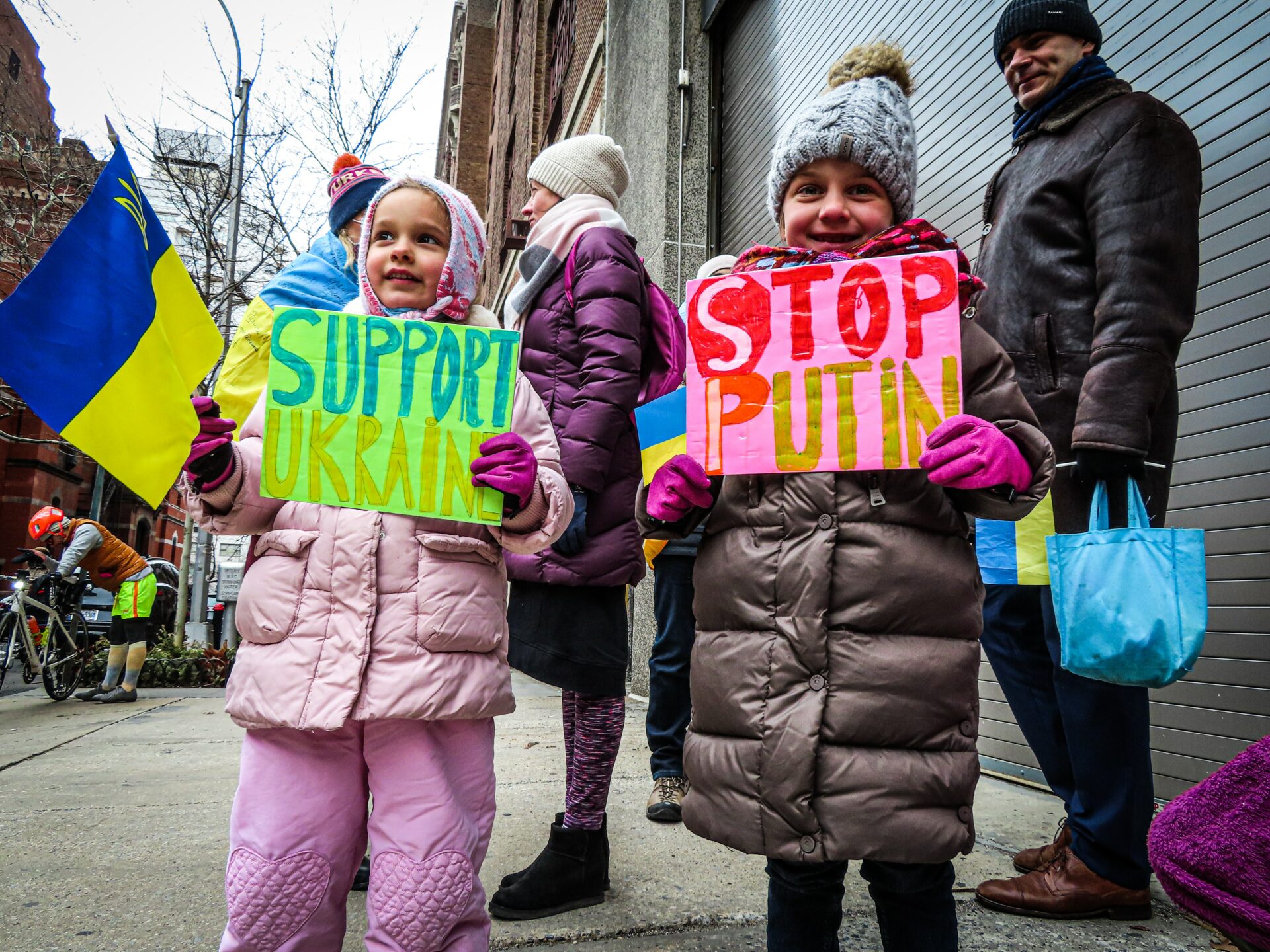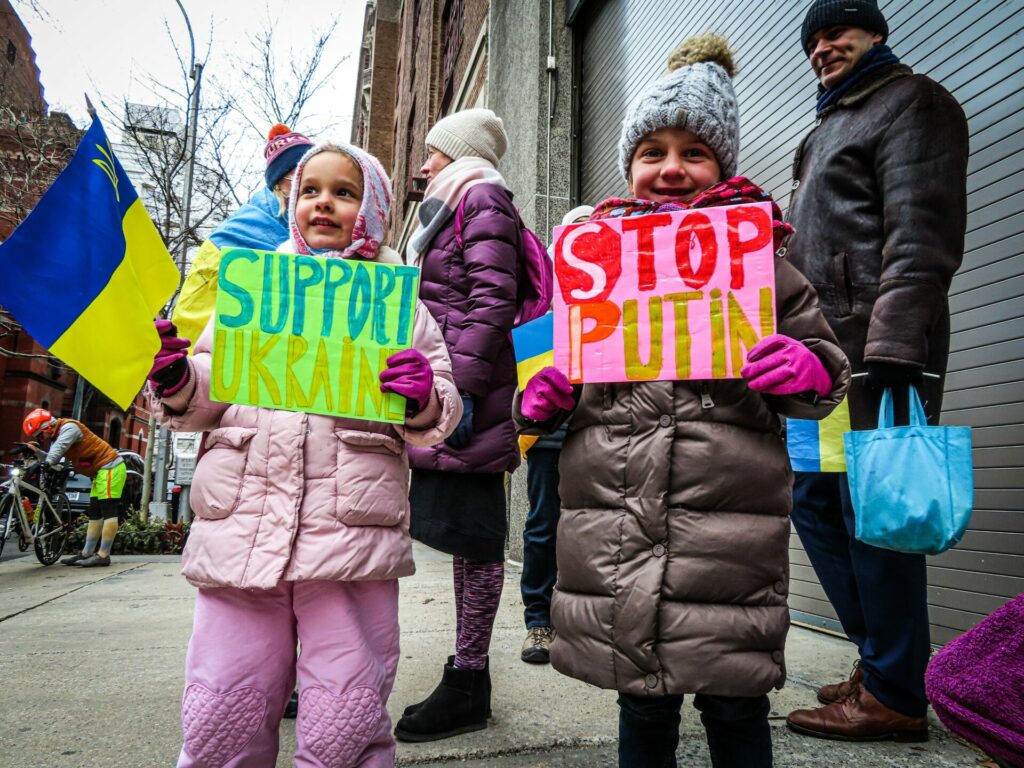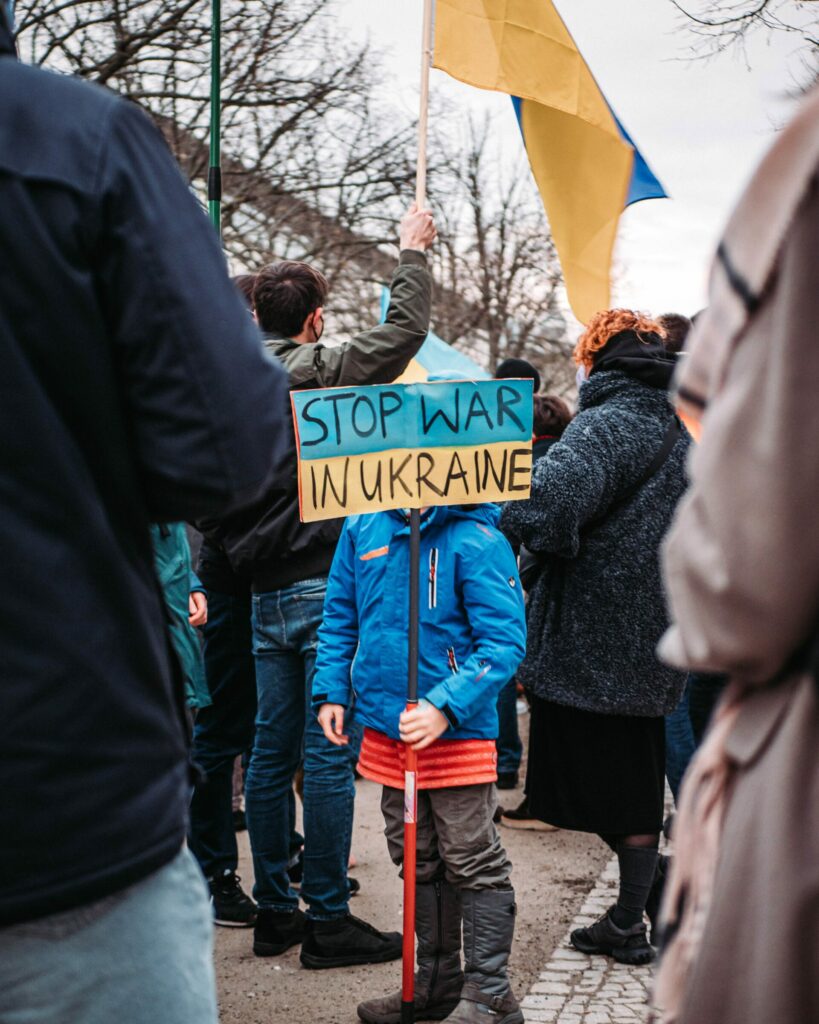

The fear response, anxiety, and sheer panic has been triggered in many of us right now due to the war in Ukraine. Unfortunately, this is going to be a trying time for children, adolescents, and teenagers alike, as they try to decipher what is happening in the world right now and how this impacts us.
Prior to Russia’s invasion of Ukriane, the word war most likely not commonly heard by (younger) children and for the older ones, it may have been in a different sense such as playing video games or playing in the playground. I have outlined some ideas of how to approach the sensitive subject with children.
Check how you are feeling first
Before starting the conversation with your children be mindful of your feelings of the war, children will take emotional cues from adults, you will be your children’s safe places, which means your child will need you to have your emotions under control so you can help them to process theirs. You don’t need to know the answers, just provide the space for them to talk about their worries. Talking about a problem together can help to navigate their feelings so they can better understand what is happening. Whilst discussing the war and any worries be careful not to over share your fears with your child. Be ever mindful of your emotions and your body language. Remain calm and focused.
While adults try to understand the overwhelming news, children will be hearing reports of what is occurring and feel confused and frightened. It’s happened in my house; the news was on constantly and naturally I wanted to protect my daughter and so I would turn it off. If it was my decision, it wouldn’t have been on whilst she was up. But I realised she will need to have the space to talk about it or for me to explain a little of what is going on. She is 6 and hasn’t covered wars and aside from playground games and nerf battles she may find it all confusing. I found it confusing and overwhelming, what could I do?
It's only natural to want to protect children from frightening things, but as parents and caregivers we need to be able to talk about war and the unpleasantness that we know is in the world with them. For example, when I gave my daughter the space to ask questions, I was surprised that she expected to see tanks coming down our street, to bundle all her worldly possessions in a carrier bag; as she has seen on the news and she didn’t know what to take. From this interaction, I realise now I maybe should have been more prepared- what did she need to know? What do I need to explain to her? What are the facts? But also gave me insight that she was after comfort and reassurance- she wanted to know are we safe? And she wanted the facts, I didn’t need to go into great detail. It is from this interaction that gave me the awareness and understanding of what children may need from parents at this time. Children will always look to their parents/ caregivers for the sense of safety and security, and even more so in times of crisis.
I showed her on the map where Russia is and where Ukraine is and how far away, we are and how we are protected by the sea. Explaining that the war is far away and we are safe, we don’t need to prepare for anything- we can continue as normal.

Be open, give them the space to explore how they feel
It is important to find out what they know and how it is making them feel, don’t discuss it before bed time but find a time when you can bring it up naturally, allow the time, try not to rush the conversation. Maybe at tea time when your child is more likely to feel comfortable. It is better to have the conversation and find out that they don’t know what is happening or maybe aren’t bothered by what is happening rather than having a child who is silently worrying about the war. Children might find it helpful to draw, or make a story of how they are feeling. If your child does ask at bedtime, try to answer their concerns but aim to finish with something positive such reading a loved story or singing favourite songs to help them to sleep well. When possible, create positive distractions; playing games or doing outdoor activities.
Remember you won’t be able to answer every question- that is ok. You may need to find the answer or con find the answers together- if your child is older.
Control the news
It maybe worth checking how your child can access news, as a society we are always connected to the internet, our phones notify us of world events constantly, it could be the same for your child. Be mindful of how exposed your child is to the news while there are upsetting images and worrying reports. It is important to check their devices and monitor what they see and hear- checking their devices is also a good way to reassure your child and ensure they are receiving accurate information. They may be talking about it at school, in the playground or hear us discussing it, they will need a chance to understand it as we do. It maybe you decide not to have the news on around young children. With older children you may use it as an opportunity to discuss what news sources they trust. Help to separate between the facts, rumours, possibilities and of course fake news.
Reassure, reassure, reassure
Younger children may see and hear upsetting reports from the war but not be able to distinguish between what they see on the screen and their own reality- they may think the war is here and believe themselves to be in danger. For older children, they may be monitoring the news and fear how events can escalate and what it means for them.
As often as you can offer reassurance that they are safe and free from danger.
It’s important for our children to know they can approach us to talk to, even if their question catches you by surprise- you will know what is troubling your child. It is important not to dismiss their concerns. Always acknowledge your child’s concerns and feelings, tell them what they feel is a natural response. They will need reassurance, but also it is important to find out what they have heard and what is causing the worry. The key is trying to understand it from their point of view and this change in viewpoint, you are more likely to provide comfort, understanding and reassurance. Show your child you are listening- give them your full attention and let them know they can talk to you whenever they need to.
Keep it age appropriate
It is important to keep it age appropriate; all children have a right to know what is happening in the world but our role as parents and caregivers is to do this in safe environment so that they don’t become more distressed. Therefore, it is important to watch their reactions and consider their level of fear.

Careful not to discriminate
As we explain the war we need to be careful if what words we use, so that we aren’t causing prejudice or discrimination towards people or countries. Avoid using words such as evil and bad people. Try to focus on compassion and empathy for the families that have been forced to flee their homes. Children will copy what we say, we want to reduce discrimination and bullying. Even though the war is in a distant country, it can still generate discriminate behaviour and language; check your child isn’t experiencing or contributing to bullying, encourage them to tell you or an adult they trust if they have been called names or bullied at school- everyone deserves to feel safe in school and in society. Encourage kindness and support of each other.
Look for the helpers
Remind your child there are people working to help solve the conflict- some you will see; some you won’t be able to see and these people are working very hard to stop the conflict. It maybe helpful to focus on the helpers. It is important with this level of violence children know there are people helping other people, there are others that are showing compassion, kindness, courage, gentleness. Look at the people queuing to give blood, look at the emergency services, look at the people calling for peace. Look for the positive stories. It maybe your child wants to raise money or take part in some positive action for people on Ukraine. Often the sense of doing something, no matter how small can provide great comfort.
Regular check ins
When you’re coming to the end of the discussion, try to assess their level of worry- check their body language, their breathing, ensure they aren’t in distress. Remind them that you’re there to listen and support them with their worries and that you care. As the conflict continues, ensure you check in with your child to see how they are feeling, if they have any new questions or anything they want to discuss with you. Monitor their behaviour- anxious worries could been shown as physical symptoms such as stomach aches, headaches or changes to sleeping routines. As the war continues, younger children may show different reactions and the signs of distress may not be as obvious as older children. Signs to look out for in younger children are increased clinginess, older children may display intense grief or anger. All which are normal if they last a short time, if it is for a prolonged period of time, your child may require specialised support.
Breathing exercise
To help reduce stress in your children, it could be beneficial to do some belly breathing exercises together:
Place your hands on your tummy, take 5 deep breaths, 5 seconds breathing in and 7 seconds breathing out; in through your nose and out through your mouth.
When inhaling explain you are softly bowing your tummy up like a balloon and exhaling, the air is slowly leaving the balloon.
